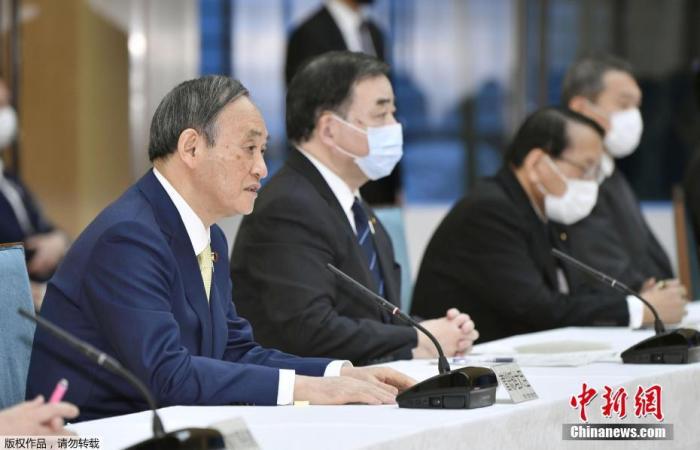China News Service, October 18th. According to Kyodo News, Japan’s 49th House of Representatives election is coming soon.
In order to welcome the vote count on the 31st, nine political parties and candidates without party affiliation will start a 12-day election campaign, focusing on the new crown epidemic response and economic policy.
Statistics show that more than 1,040 people plan to run for the election.
Regarding voters' attention to the House of Representatives election and the tendency of political parties to support it, the latest poll shows that 29.6% of the voters who voted are the Liberal Democratic Party, which is a significant lead.
In addition, when asked whether the Kishida Fumio government should inherit the lines of the two administrations of Shinzo Abe and Yoshihide Suga, only 26.7% of the interviewees said they “should inherit”, and up to 68.9% said they “should change”.
Data map: On October 4, local time, Fumio Kishida, President of the Japanese Liberal Democratic Party, was elected as the 100th Prime Minister after being named by the prime minister in the plenary session of the House of Representatives.
The picture shows Fumio Kishida (middle) standing up to thank him.
Statistics: more than 1,040 people from the ruling and opposition parties in Japan will stand for election
Statistics from Kyodo News on the 17th showed that for a total of 465 seats in 289 small constituencies and 176 proportional representatives, more than 1,040 people plan to stand for election.
Japanese Prime Minister Fumio Kishida (President of the Liberal Democratic Party) inspected the Fukushima Daiichi Nuclear Power Plant of Tokyo Electric Power Company in Fukushima Prefecture on the 17th. After that, he told the media in Tomioka Town, the prefecture that “there are still many issues” and emphasized that he would work to prevent accidents again. happen.
Natsuo Yamaguchi, the leader of the Japanese Komei Party, gave a street speech in Kawaguchi City, Saitama Prefecture, referring to the new crown, saying that "The Komei Party, which has a network of prefectural and city councils across the country, has the power to listen to weak voices and implement policies as a force" and appealed for support.
On the other hand, the head of the Japanese Cadet Party, Yukio Edano, took to the streets of Fukuoka City, criticizing the new crown epidemic prevention measures and economic countermeasures that have continued from the two administrations of Shinzo Abe and Yoshihide Suga to the present, and emphasized that "the Liberal Democratic Party government must be replaced. We have done it." Psychological preparation for regime change".
Data map: On April 13, the Japanese government officially decided that the nuclear sewage from the Fukushima Daiichi Nuclear Power Plant will be discharged into the sea after being filtered and diluted.
According to Kyodo News, on the morning of the 13th, the then Japanese Prime Minister Yoshihide Suga held a cabinet meeting to formally decide to discharge the sewage from the Fukushima Daiichi Nuclear Power Plant into the sea.
The picture shows Japanese Prime Minister Yoshihide Suga (first from left) attending a cabinet meeting.
Poll: 68% of voters demanded to change the "Abe and Yoshihide Suga line"
Kyodo News Agency of Japan conducted a national telephone public opinion survey (the first survey of election trends) on the 16th and 17th to grasp the voters' attention to the House of Representatives election and the tendency of political parties to support it.
The results showed that the proportional representation was 29.6% of the Liberal Democratic Party, 9.7% of the Cadet Party, and the Liberal Democratic Party led by a large margin.
When asked whether the Kishida Fumio government should inherit the lines of the two administrations of Shinzo Abe and Yoshihide Suga, only 26.7% of the interviewees said that they should inherit, and 68.9% believed that they should be changed.
Following the Liberal Democratic Party and the Liberal Democratic Party, the voting objects represented by the proportional representatives are 4.8% of the Communist Party, 4.7% of the Komeito, 3.9% of the Japan Restoration, 0.7% of the National Democratic Party, 0.5% of the Reiwa Shinsengumi, 0.5% of the Social Democratic Party, and "undecided". Than 39.4%.
Regarding the ideal election results, the answer stated that "the ruling party and the opposition parties are inseparable in power" accounted for the highest proportion, reaching 45.2%, followed by "the ruling party surpassed the opposition parties" by 36.3%, and "the ruling party and the opposition parties reversed" by 13.9%. .
Regarding economic policy, as to which side should be paid more attention to growth and distribution that will be the point of contention, including "inclination", "emphasis on growth" accounted for 57.2% and "emphasis on distribution" accounted for 36.3%.
Regarding the election for the House of Representatives, 69.6% of the respondents said they were "very interested" and "interested to some extent". According to reports, this means that the Japanese people are more concerned.

